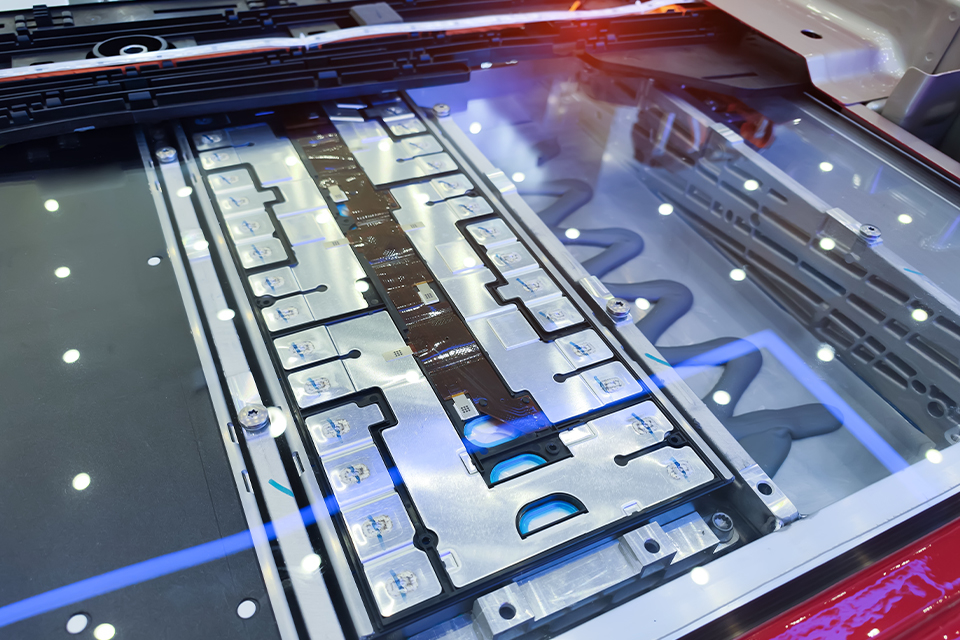Business sets the pace in a global order marked by risk and fragmentation
As governments grapple with regulation and national security priorities, the private sector has stepped into the breach

2023 was a year of change for White & Case, as I stepped into the role of Chair and my predecessor, Hugh Verrier, completed his successful 16-year tenure. The Firm began a new chapter well positioned for continued growth. This review highlights many of the achievements and pioneering initiatives that took place throughout the year.
As the world became increasingly fragmented, we focused on the global connections that matter to our clients. We collaborated across borders, providing integrated services and maintaining the strong personal and professional bonds that make a difference, particularly in uncertain times.
Our work on high-stakes deals, disputes and pro bono matters placed us at the center of industry trends related to energy transition, finance, technology and more. We contributed to the conversation on these issues, publishing insights that included a comprehensive report on the future of globalization. Our report, A world of clubs and fences: Changing regulation and the remaking of globalization, puts forward a new conceptual model to understand cross-border interconnectedness in a time of sweeping legal and regulatory changes.
We also increased our ability to serve clients, promoting 46 new partners and welcoming 36 lateral partners. We continued to find innovative solutions that enhance client services and foster efficiency. And as generative AI continues to make headlines, we developed tools that will enable us to embrace its possibilities, while carefully managing its risks.
Looking ahead, White & Case enters its next phase with a solid foundation and an ambitious growth plan that will keep us at the forefront of the rapidly changing legal industry. I look forward to what we and our clients will accomplish together in the coming years.
Guest speakers at Firm events share views on timely topics
As governments grapple with regulation and national security priorities, the private sector has stepped into the breach

Our learned behavior and ideas about work may keep us from operating at our best

By uniting industry participants who may seem to have divergent interests, the Global Battery Alliance is paving the way for a sustainable battery supply chain

Developments that reshaped the world
The war in Ukraine and high energy prices challenged energy transition timetables, but governments and investors were determined to stay the course

M&A and debt market activity declined in 2023, as high interest rates and macroeconomic dislocation saw increasingly cautious dealmakers and lenders put deployment on hold

Growth and investment in generative artificial intelligence (GenAI) lifted the technology sector after a slowdown in transaction activity throughout 2023, but regulatory challenges loomed large

The relatively free cross-border flow of goods, capital, information and people that have characterized globalization for decades is being replaced by regulatory "clubs" and "fences"

Highlights of our work in 2023
Our achievements position us for success
US$2.95 billion in revenue
2,559 total lawyers
1,291EMEA
998Americas
271Asia-Pacific
1,220US-qualified lawyers
550English-qualified lawyers

In markets around the world, White & Case earned many of the legal industry’s top accolades

White & Case is committed to fair and ethical operations that respect the interests of our stakeholders and recognize the importance of protecting our environment. Our Responsible Business Subcommittee leads environmental, social and governance (ESG) and sustainability efforts across our global operations.
As a signatory to the UN Global Compact, we affirm our commitment to doing business responsibly by aligning our operations with the Compact’s ten principles on human rights, labor, the environment and anti-corruption. Our most recent Communication on Progress outlines the steps we are taking to continue to embed these principles into our Firm’s operations.
Our latest Environmental Sustainability Report includes information on our sustainable operations, scope 1, 2 and 3 greenhouse gas emissions data, and our most recent Environmental Management Systems survey. Highlights from 2023 include:
Committed to advancing diversity and inclusion across the Firm
11 global affinity networks
Our 11 affinity networks foster a sense of community among the Firm’s Black, Asia-Pacific, Latinx/Hispanic, Middle Eastern and North African, minority ethnic and LGBTQ+ lawyers, business services professionals and their allies. Each network sets its own agenda, initiatives and goals, which are specific to the issues it considers most important. Affinity networks create and enhance awareness of these groups within the Firm and its larger culture, drive community and connection across our global offices, and support their members with career and professional development opportunities.
24 local women’s networks
Our 24 local women’s networks are active in 40 offices across the Americas, EMEA and Asia-Pacific. These networks foster professional development and mentoring activities. They also provide a forum for our lawyers and business services professionals to share perspectives and create programs to support and retain our women while fostering and promoting gender equity.
42% of the Firm’s global management
50% of the Executive Committee
21% of other leadership roles
36% of our 2023 global partner promotions
25% of global Partnership
43% of our lawyers
42% of our lawyers self-identify as of color
7% of our lawyers self-identify as LGBTQ+
4% of our lawyers self-identify with disabilities
28% of our partners self-identify as of color
3% of our partners self-identify as LGBTQ+
4% of our partners self-identify with disabilities
32% of our lawyers self-identify as of color
10% of our lawyers self-identify as LGBTQ+
4% of our lawyers self-identify with disabilities
13% of our partners self-identify as of color
5% of our partners self-identify as LGBTQ+
2% of our partners self-identify with disabilities
125nationalities
92languages spoken
Our commitment to diversity and inclusion is recognized by leading publications and alliance organizations
White & Case women gather to build connections and advance career opportunities

6 continents
44offices
30countries
An internal guide addresses 20 areas of legislation in four Asia-Pacific countries

A transformative technology enables new ways of working

Photo by © ASF - Architect Simone Forconi
iBridge, an interactive pedestrian bridge submitted for a design competition. Sensors on the floor of the bridge allow it to transform pedestrian and cycling traffic into usable energy.

Inga Petersen is the executive director of the Global Battery Alliance (GBA), a partnership of more than 150 businesses, governments, academics and non-governmental organizations, that works to ensure that battery production scales in a way that supports green energy, safeguards human rights and promotes environmental sustainability. Founded at the World Economic Forum in 2017, the GBA was incorporated as an independent organization in 2022, with pro bono assistance from White & Case.
Petersen spoke during our October 2023 webinar, "Unlocking the Future of the Global Battery Supply Chain," which recognized the critical role that batteries will play in the energy transition. We talked to her about the need for unified action in a divided world, how parties with diametrically opposed views can reach consensus and reasons to be hopeful that a sustainable battery supply chain will become a reality. An edited version of that conversation follows.
You've described the GBA's approach as "unique." What makes it unprecedented?
First, we look at the entire value chain, from the companies that mine the raw materials used in batteries to battery cell manufacturers to OEMs (original equipment manufacturers) and all the way to recyclers. Second—and critically—we counterbalance industry voices with those of non-corporate stakeholders. The politically neutral space we've created is especially rare in today's geopolitical environment, where access to resources and domesticated supply chains are key issues. We're focused not on these geopolitical concerns, but on the steps needed to create a universal standard for sustainable battery performance and to implement the sustainable value chain by 2030.
In 2023, the GBA launched the world's first battery passport proof-of-concept pilots. In simple terms, what is a battery passport?
A battery passport is a digital product passport that can be compared to a personal passport that an individual needs to cross a border. For example, if a battery wants to enter the EU and be sold on the EU market, it would have to show its passport at the border, showing where its materials and minerals come from and demonstrating that it has a "visa" on issues like human rights performance and battery carbon footprint.
What's next for the battery passport?
After working with our partner organizations Audi, Tesla and their entire value chains to launch three separate proof-of-concept pilots, we are now looking to scale to a minimum viable product over the next couple of years. Part of that will require defining the remaining sustainability metrics. We started with metrics related to the battery's carbon footprint, child labor and human rights due diligence. These are very important, but they are only three salient issues in the value chain. We've gone through a prioritization exercise with our members to decide which issues to address next.
How does the GBA move its members toward agreement when their outlooks are often poles apart?
We don't embrace the ideas of winners and losers, and majority voting where you see different camps form. Instead, we take a systemic consensus-building approach that asks strategic questions and offers various options. For example, we might ask, "Should the GBA develop substantive databases and IT infrastructure to deliver on the battery passport, or should we focus instead on rulemaking?" The answers could be different degrees of investment or a compromise, such as a strategic partnership with a third party that delivers on the infrastructure. You then test the group's level of resistance to each option and try to refine the option with the lowest level of resistance to get the highest level of buy-in. Ultimately, our members are united in their commitment to a more sustainable battery value chain and recognize that batteries are essential for the energy transition.
Are you optimistic that the GBA will achieve its vision of a fully sustainable battery supply chain by 2030?
I'm optimistic that it's going to be a reality for some battery products, maybe not for all. When I look at some of the biggest players we've brought together, I see a real commitment and a profound realization that a sustainable value chain is not a nice-to-have, but rather a must-have. This is being reinforced by regulations, such as the EU Batteries Regulation and Ecodesign Directive. So there's real traction and, if policies like these are harmonized at the global level, you will see transformation accelerate.
Photo by © Kynny / GettyImages
A lithium battery pack and power connectors in an electric car